Expert Opinions as Crucial Evidence: An Analysis of Australian Law
VerifiedAdded on 2023/06/12
|14
|4746
|310
Essay
AI Summary
This essay delves into the critical role of expert opinions within the Australian legal system, particularly in the context of evidence law. It highlights that while the standard for establishing facts differs between civil (balance of probabilities) and criminal (beyond reasonable doubt) proceedings, expert opinions are often essential for courts to understand complex issues. The essay emphasizes that expert witnesses, due to their specialized knowledge, can provide insights beyond the judge's expertise, influencing court decisions. However, the admissibility of expert evidence is contingent upon its relevance to the case, the expert's ability to substantiate their reasoning, and the trial judge's discretion to prevent unfairly prejudicial or misleading information. The essay also references the Uniform Evidence Legislation and relevant case law, such as the Makita case, to illustrate the requirements for admissible expert opinions, including the need for a clear connection between specialized knowledge and the opinion presented. Ultimately, the essay concludes that while expert opinions are subject to examination and cross-examination, their reliability and validity stem from the expert's credibility and the supporting facts, making them a valuable tool for achieving reasonable settlements and informed judgments in court.
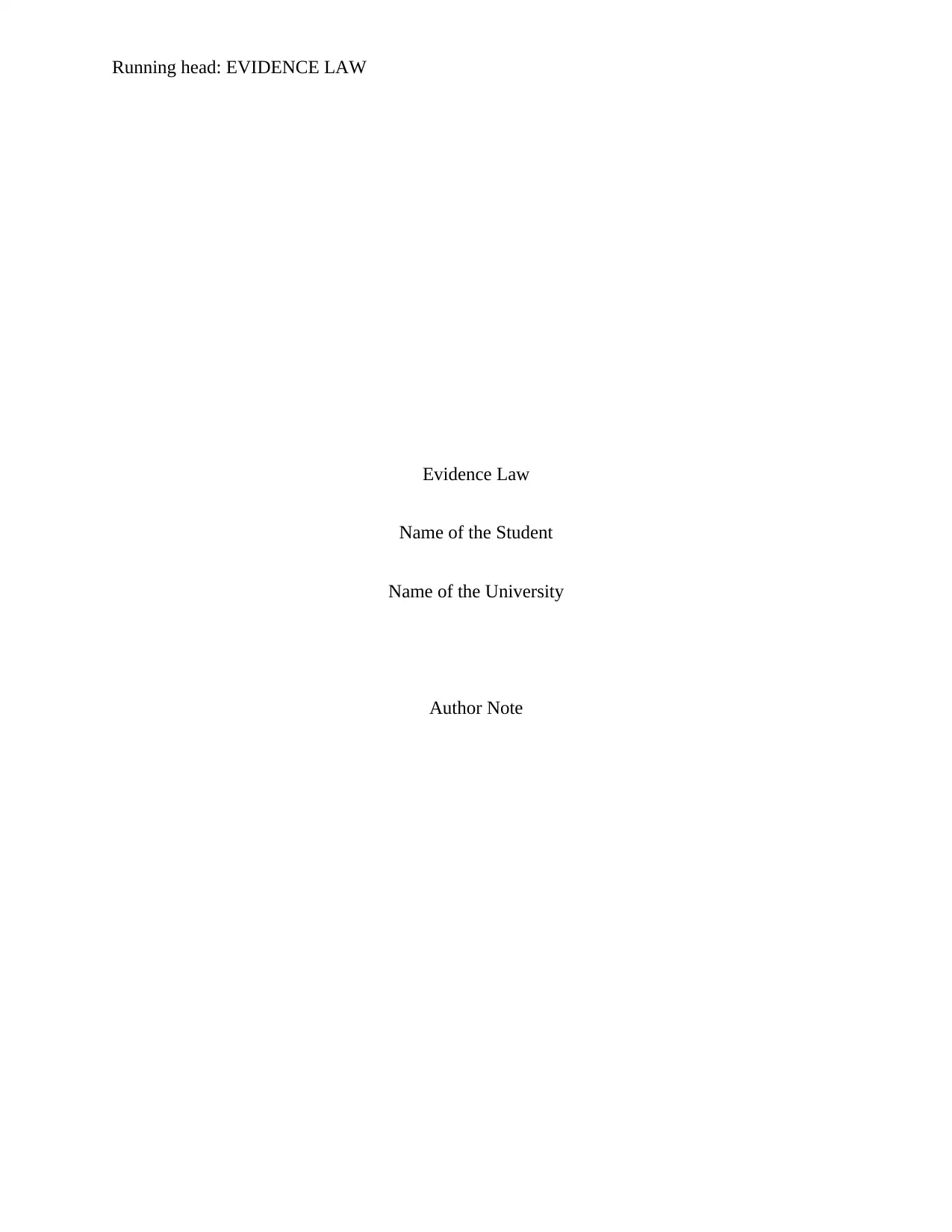
Running head: EVIDENCE LAW
Evidence Law
Name of the Student
Name of the University
Author Note
Evidence Law
Name of the Student
Name of the University
Author Note
Paraphrase This Document
Need a fresh take? Get an instant paraphrase of this document with our AI Paraphraser
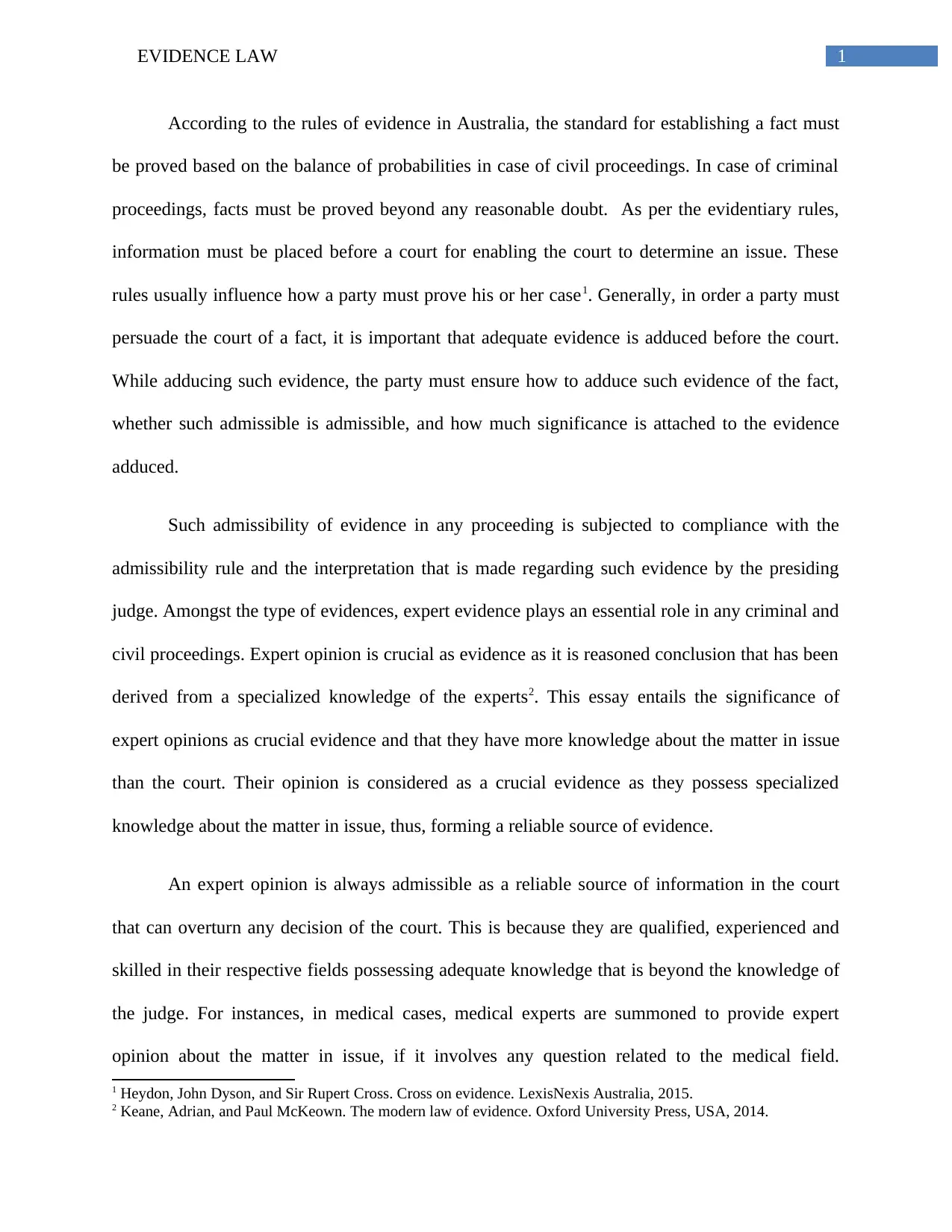
1EVIDENCE LAW
According to the rules of evidence in Australia, the standard for establishing a fact must
be proved based on the balance of probabilities in case of civil proceedings. In case of criminal
proceedings, facts must be proved beyond any reasonable doubt. As per the evidentiary rules,
information must be placed before a court for enabling the court to determine an issue. These
rules usually influence how a party must prove his or her case1. Generally, in order a party must
persuade the court of a fact, it is important that adequate evidence is adduced before the court.
While adducing such evidence, the party must ensure how to adduce such evidence of the fact,
whether such admissible is admissible, and how much significance is attached to the evidence
adduced.
Such admissibility of evidence in any proceeding is subjected to compliance with the
admissibility rule and the interpretation that is made regarding such evidence by the presiding
judge. Amongst the type of evidences, expert evidence plays an essential role in any criminal and
civil proceedings. Expert opinion is crucial as evidence as it is reasoned conclusion that has been
derived from a specialized knowledge of the experts2. This essay entails the significance of
expert opinions as crucial evidence and that they have more knowledge about the matter in issue
than the court. Their opinion is considered as a crucial evidence as they possess specialized
knowledge about the matter in issue, thus, forming a reliable source of evidence.
An expert opinion is always admissible as a reliable source of information in the court
that can overturn any decision of the court. This is because they are qualified, experienced and
skilled in their respective fields possessing adequate knowledge that is beyond the knowledge of
the judge. For instances, in medical cases, medical experts are summoned to provide expert
opinion about the matter in issue, if it involves any question related to the medical field.
1 Heydon, John Dyson, and Sir Rupert Cross. Cross on evidence. LexisNexis Australia, 2015.
2 Keane, Adrian, and Paul McKeown. The modern law of evidence. Oxford University Press, USA, 2014.
According to the rules of evidence in Australia, the standard for establishing a fact must
be proved based on the balance of probabilities in case of civil proceedings. In case of criminal
proceedings, facts must be proved beyond any reasonable doubt. As per the evidentiary rules,
information must be placed before a court for enabling the court to determine an issue. These
rules usually influence how a party must prove his or her case1. Generally, in order a party must
persuade the court of a fact, it is important that adequate evidence is adduced before the court.
While adducing such evidence, the party must ensure how to adduce such evidence of the fact,
whether such admissible is admissible, and how much significance is attached to the evidence
adduced.
Such admissibility of evidence in any proceeding is subjected to compliance with the
admissibility rule and the interpretation that is made regarding such evidence by the presiding
judge. Amongst the type of evidences, expert evidence plays an essential role in any criminal and
civil proceedings. Expert opinion is crucial as evidence as it is reasoned conclusion that has been
derived from a specialized knowledge of the experts2. This essay entails the significance of
expert opinions as crucial evidence and that they have more knowledge about the matter in issue
than the court. Their opinion is considered as a crucial evidence as they possess specialized
knowledge about the matter in issue, thus, forming a reliable source of evidence.
An expert opinion is always admissible as a reliable source of information in the court
that can overturn any decision of the court. This is because they are qualified, experienced and
skilled in their respective fields possessing adequate knowledge that is beyond the knowledge of
the judge. For instances, in medical cases, medical experts are summoned to provide expert
opinion about the matter in issue, if it involves any question related to the medical field.
1 Heydon, John Dyson, and Sir Rupert Cross. Cross on evidence. LexisNexis Australia, 2015.
2 Keane, Adrian, and Paul McKeown. The modern law of evidence. Oxford University Press, USA, 2014.
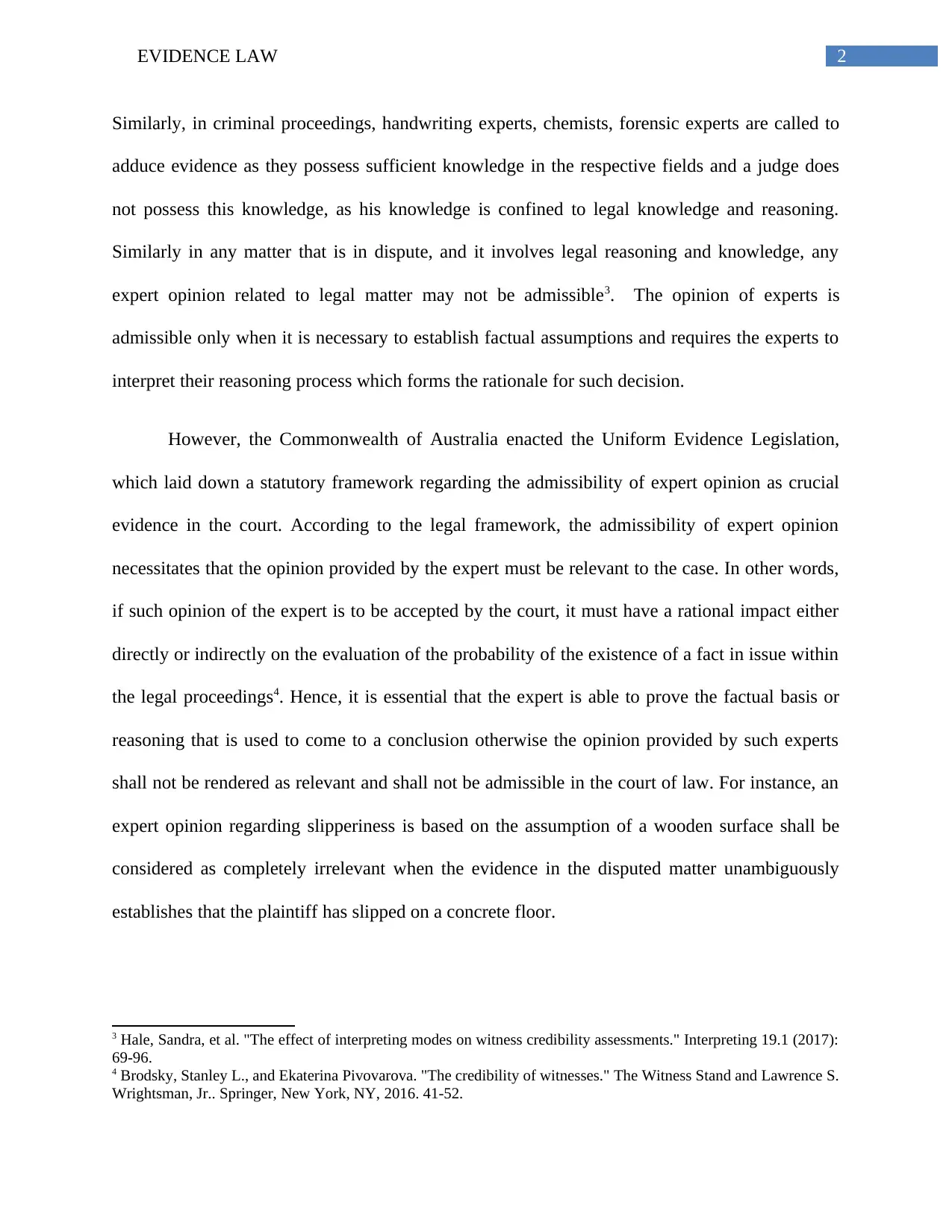
2EVIDENCE LAW
Similarly, in criminal proceedings, handwriting experts, chemists, forensic experts are called to
adduce evidence as they possess sufficient knowledge in the respective fields and a judge does
not possess this knowledge, as his knowledge is confined to legal knowledge and reasoning.
Similarly in any matter that is in dispute, and it involves legal reasoning and knowledge, any
expert opinion related to legal matter may not be admissible3. The opinion of experts is
admissible only when it is necessary to establish factual assumptions and requires the experts to
interpret their reasoning process which forms the rationale for such decision.
However, the Commonwealth of Australia enacted the Uniform Evidence Legislation,
which laid down a statutory framework regarding the admissibility of expert opinion as crucial
evidence in the court. According to the legal framework, the admissibility of expert opinion
necessitates that the opinion provided by the expert must be relevant to the case. In other words,
if such opinion of the expert is to be accepted by the court, it must have a rational impact either
directly or indirectly on the evaluation of the probability of the existence of a fact in issue within
the legal proceedings4. Hence, it is essential that the expert is able to prove the factual basis or
reasoning that is used to come to a conclusion otherwise the opinion provided by such experts
shall not be rendered as relevant and shall not be admissible in the court of law. For instance, an
expert opinion regarding slipperiness is based on the assumption of a wooden surface shall be
considered as completely irrelevant when the evidence in the disputed matter unambiguously
establishes that the plaintiff has slipped on a concrete floor.
3 Hale, Sandra, et al. "The effect of interpreting modes on witness credibility assessments." Interpreting 19.1 (2017):
69-96.
4 Brodsky, Stanley L., and Ekaterina Pivovarova. "The credibility of witnesses." The Witness Stand and Lawrence S.
Wrightsman, Jr.. Springer, New York, NY, 2016. 41-52.
Similarly, in criminal proceedings, handwriting experts, chemists, forensic experts are called to
adduce evidence as they possess sufficient knowledge in the respective fields and a judge does
not possess this knowledge, as his knowledge is confined to legal knowledge and reasoning.
Similarly in any matter that is in dispute, and it involves legal reasoning and knowledge, any
expert opinion related to legal matter may not be admissible3. The opinion of experts is
admissible only when it is necessary to establish factual assumptions and requires the experts to
interpret their reasoning process which forms the rationale for such decision.
However, the Commonwealth of Australia enacted the Uniform Evidence Legislation,
which laid down a statutory framework regarding the admissibility of expert opinion as crucial
evidence in the court. According to the legal framework, the admissibility of expert opinion
necessitates that the opinion provided by the expert must be relevant to the case. In other words,
if such opinion of the expert is to be accepted by the court, it must have a rational impact either
directly or indirectly on the evaluation of the probability of the existence of a fact in issue within
the legal proceedings4. Hence, it is essential that the expert is able to prove the factual basis or
reasoning that is used to come to a conclusion otherwise the opinion provided by such experts
shall not be rendered as relevant and shall not be admissible in the court of law. For instance, an
expert opinion regarding slipperiness is based on the assumption of a wooden surface shall be
considered as completely irrelevant when the evidence in the disputed matter unambiguously
establishes that the plaintiff has slipped on a concrete floor.
3 Hale, Sandra, et al. "The effect of interpreting modes on witness credibility assessments." Interpreting 19.1 (2017):
69-96.
4 Brodsky, Stanley L., and Ekaterina Pivovarova. "The credibility of witnesses." The Witness Stand and Lawrence S.
Wrightsman, Jr.. Springer, New York, NY, 2016. 41-52.
⊘ This is a preview!⊘
Do you want full access?
Subscribe today to unlock all pages.

Trusted by 1+ million students worldwide
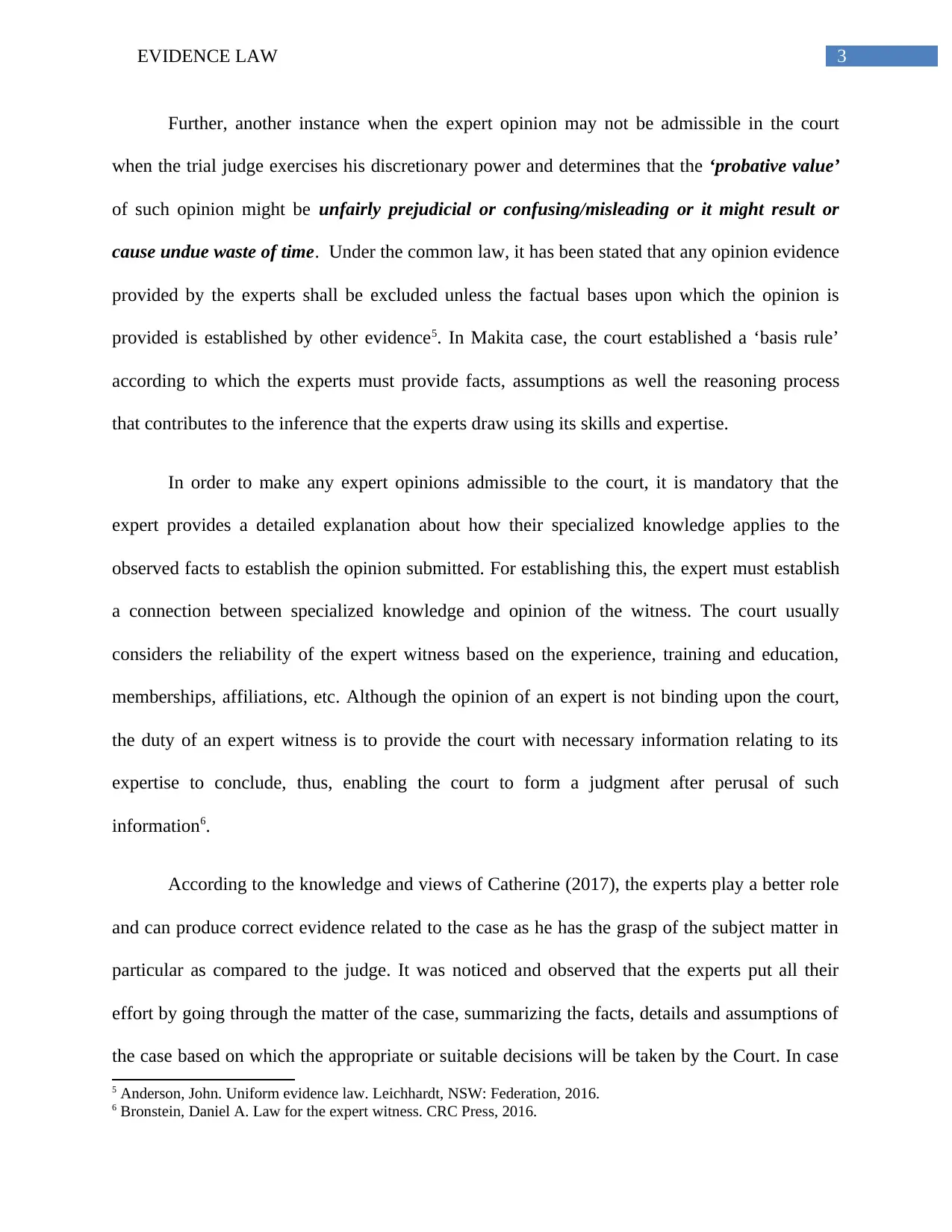
3EVIDENCE LAW
Further, another instance when the expert opinion may not be admissible in the court
when the trial judge exercises his discretionary power and determines that the ‘probative value’
of such opinion might be unfairly prejudicial or confusing/misleading or it might result or
cause undue waste of time. Under the common law, it has been stated that any opinion evidence
provided by the experts shall be excluded unless the factual bases upon which the opinion is
provided is established by other evidence5. In Makita case, the court established a ‘basis rule’
according to which the experts must provide facts, assumptions as well the reasoning process
that contributes to the inference that the experts draw using its skills and expertise.
In order to make any expert opinions admissible to the court, it is mandatory that the
expert provides a detailed explanation about how their specialized knowledge applies to the
observed facts to establish the opinion submitted. For establishing this, the expert must establish
a connection between specialized knowledge and opinion of the witness. The court usually
considers the reliability of the expert witness based on the experience, training and education,
memberships, affiliations, etc. Although the opinion of an expert is not binding upon the court,
the duty of an expert witness is to provide the court with necessary information relating to its
expertise to conclude, thus, enabling the court to form a judgment after perusal of such
information6.
According to the knowledge and views of Catherine (2017), the experts play a better role
and can produce correct evidence related to the case as he has the grasp of the subject matter in
particular as compared to the judge. It was noticed and observed that the experts put all their
effort by going through the matter of the case, summarizing the facts, details and assumptions of
the case based on which the appropriate or suitable decisions will be taken by the Court. In case
5 Anderson, John. Uniform evidence law. Leichhardt, NSW: Federation, 2016.
6 Bronstein, Daniel A. Law for the expert witness. CRC Press, 2016.
Further, another instance when the expert opinion may not be admissible in the court
when the trial judge exercises his discretionary power and determines that the ‘probative value’
of such opinion might be unfairly prejudicial or confusing/misleading or it might result or
cause undue waste of time. Under the common law, it has been stated that any opinion evidence
provided by the experts shall be excluded unless the factual bases upon which the opinion is
provided is established by other evidence5. In Makita case, the court established a ‘basis rule’
according to which the experts must provide facts, assumptions as well the reasoning process
that contributes to the inference that the experts draw using its skills and expertise.
In order to make any expert opinions admissible to the court, it is mandatory that the
expert provides a detailed explanation about how their specialized knowledge applies to the
observed facts to establish the opinion submitted. For establishing this, the expert must establish
a connection between specialized knowledge and opinion of the witness. The court usually
considers the reliability of the expert witness based on the experience, training and education,
memberships, affiliations, etc. Although the opinion of an expert is not binding upon the court,
the duty of an expert witness is to provide the court with necessary information relating to its
expertise to conclude, thus, enabling the court to form a judgment after perusal of such
information6.
According to the knowledge and views of Catherine (2017), the experts play a better role
and can produce correct evidence related to the case as he has the grasp of the subject matter in
particular as compared to the judge. It was noticed and observed that the experts put all their
effort by going through the matter of the case, summarizing the facts, details and assumptions of
the case based on which the appropriate or suitable decisions will be taken by the Court. In case
5 Anderson, John. Uniform evidence law. Leichhardt, NSW: Federation, 2016.
6 Bronstein, Daniel A. Law for the expert witness. CRC Press, 2016.
Paraphrase This Document
Need a fresh take? Get an instant paraphrase of this document with our AI Paraphraser
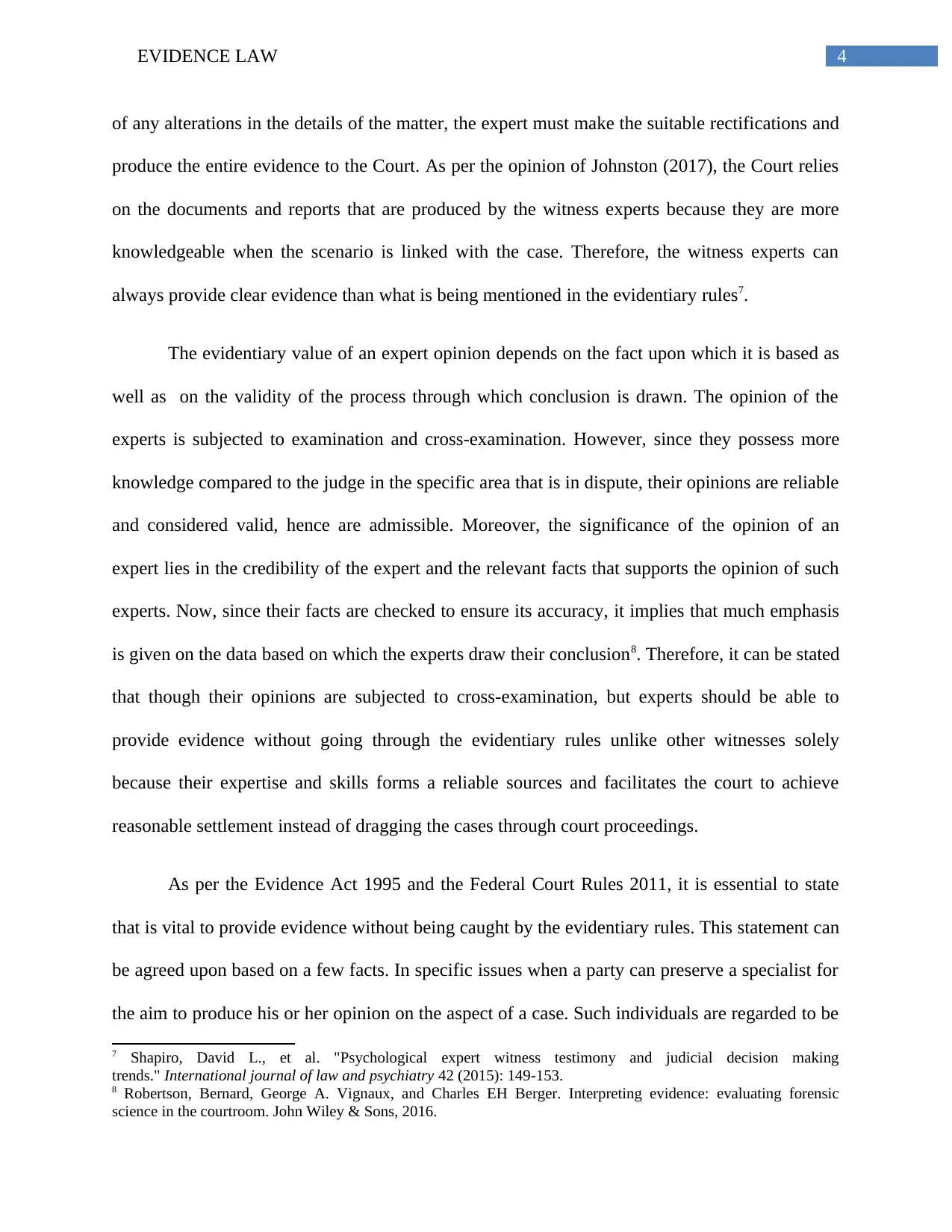
4EVIDENCE LAW
of any alterations in the details of the matter, the expert must make the suitable rectifications and
produce the entire evidence to the Court. As per the opinion of Johnston (2017), the Court relies
on the documents and reports that are produced by the witness experts because they are more
knowledgeable when the scenario is linked with the case. Therefore, the witness experts can
always provide clear evidence than what is being mentioned in the evidentiary rules7.
The evidentiary value of an expert opinion depends on the fact upon which it is based as
well as on the validity of the process through which conclusion is drawn. The opinion of the
experts is subjected to examination and cross-examination. However, since they possess more
knowledge compared to the judge in the specific area that is in dispute, their opinions are reliable
and considered valid, hence are admissible. Moreover, the significance of the opinion of an
expert lies in the credibility of the expert and the relevant facts that supports the opinion of such
experts. Now, since their facts are checked to ensure its accuracy, it implies that much emphasis
is given on the data based on which the experts draw their conclusion8. Therefore, it can be stated
that though their opinions are subjected to cross-examination, but experts should be able to
provide evidence without going through the evidentiary rules unlike other witnesses solely
because their expertise and skills forms a reliable sources and facilitates the court to achieve
reasonable settlement instead of dragging the cases through court proceedings.
As per the Evidence Act 1995 and the Federal Court Rules 2011, it is essential to state
that is vital to provide evidence without being caught by the evidentiary rules. This statement can
be agreed upon based on a few facts. In specific issues when a party can preserve a specialist for
the aim to produce his or her opinion on the aspect of a case. Such individuals are regarded to be
7 Shapiro, David L., et al. "Psychological expert witness testimony and judicial decision making
trends." International journal of law and psychiatry 42 (2015): 149-153.
8 Robertson, Bernard, George A. Vignaux, and Charles EH Berger. Interpreting evidence: evaluating forensic
science in the courtroom. John Wiley & Sons, 2016.
of any alterations in the details of the matter, the expert must make the suitable rectifications and
produce the entire evidence to the Court. As per the opinion of Johnston (2017), the Court relies
on the documents and reports that are produced by the witness experts because they are more
knowledgeable when the scenario is linked with the case. Therefore, the witness experts can
always provide clear evidence than what is being mentioned in the evidentiary rules7.
The evidentiary value of an expert opinion depends on the fact upon which it is based as
well as on the validity of the process through which conclusion is drawn. The opinion of the
experts is subjected to examination and cross-examination. However, since they possess more
knowledge compared to the judge in the specific area that is in dispute, their opinions are reliable
and considered valid, hence are admissible. Moreover, the significance of the opinion of an
expert lies in the credibility of the expert and the relevant facts that supports the opinion of such
experts. Now, since their facts are checked to ensure its accuracy, it implies that much emphasis
is given on the data based on which the experts draw their conclusion8. Therefore, it can be stated
that though their opinions are subjected to cross-examination, but experts should be able to
provide evidence without going through the evidentiary rules unlike other witnesses solely
because their expertise and skills forms a reliable sources and facilitates the court to achieve
reasonable settlement instead of dragging the cases through court proceedings.
As per the Evidence Act 1995 and the Federal Court Rules 2011, it is essential to state
that is vital to provide evidence without being caught by the evidentiary rules. This statement can
be agreed upon based on a few facts. In specific issues when a party can preserve a specialist for
the aim to produce his or her opinion on the aspect of a case. Such individuals are regarded to be
7 Shapiro, David L., et al. "Psychological expert witness testimony and judicial decision making
trends." International journal of law and psychiatry 42 (2015): 149-153.
8 Robertson, Bernard, George A. Vignaux, and Charles EH Berger. Interpreting evidence: evaluating forensic
science in the courtroom. John Wiley & Sons, 2016.
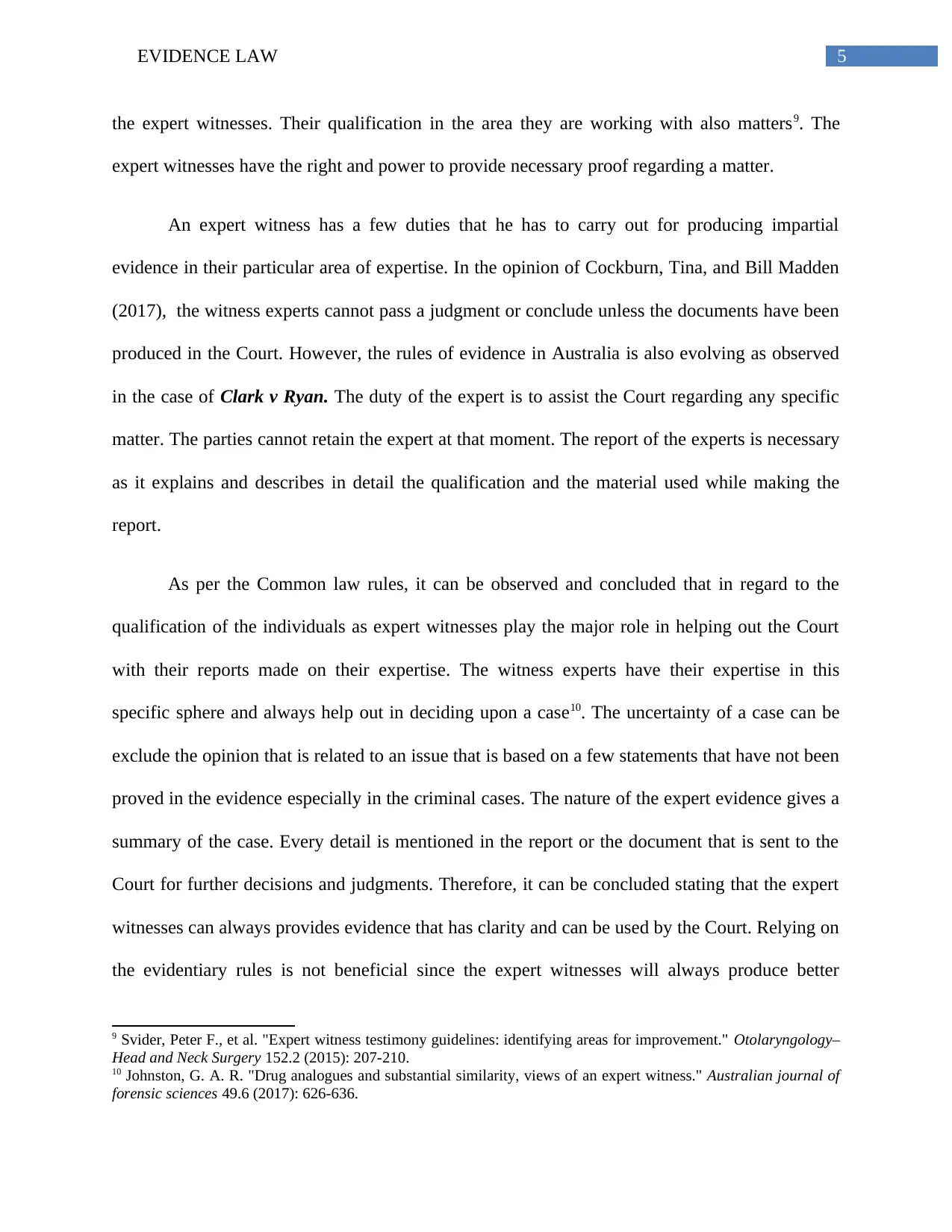
5EVIDENCE LAW
the expert witnesses. Their qualification in the area they are working with also matters9. The
expert witnesses have the right and power to provide necessary proof regarding a matter.
An expert witness has a few duties that he has to carry out for producing impartial
evidence in their particular area of expertise. In the opinion of Cockburn, Tina, and Bill Madden
(2017), the witness experts cannot pass a judgment or conclude unless the documents have been
produced in the Court. However, the rules of evidence in Australia is also evolving as observed
in the case of Clark v Ryan. The duty of the expert is to assist the Court regarding any specific
matter. The parties cannot retain the expert at that moment. The report of the experts is necessary
as it explains and describes in detail the qualification and the material used while making the
report.
As per the Common law rules, it can be observed and concluded that in regard to the
qualification of the individuals as expert witnesses play the major role in helping out the Court
with their reports made on their expertise. The witness experts have their expertise in this
specific sphere and always help out in deciding upon a case10. The uncertainty of a case can be
exclude the opinion that is related to an issue that is based on a few statements that have not been
proved in the evidence especially in the criminal cases. The nature of the expert evidence gives a
summary of the case. Every detail is mentioned in the report or the document that is sent to the
Court for further decisions and judgments. Therefore, it can be concluded stating that the expert
witnesses can always provides evidence that has clarity and can be used by the Court. Relying on
the evidentiary rules is not beneficial since the expert witnesses will always produce better
9 Svider, Peter F., et al. "Expert witness testimony guidelines: identifying areas for improvement." Otolaryngology–
Head and Neck Surgery 152.2 (2015): 207-210.
10 Johnston, G. A. R. "Drug analogues and substantial similarity, views of an expert witness." Australian journal of
forensic sciences 49.6 (2017): 626-636.
the expert witnesses. Their qualification in the area they are working with also matters9. The
expert witnesses have the right and power to provide necessary proof regarding a matter.
An expert witness has a few duties that he has to carry out for producing impartial
evidence in their particular area of expertise. In the opinion of Cockburn, Tina, and Bill Madden
(2017), the witness experts cannot pass a judgment or conclude unless the documents have been
produced in the Court. However, the rules of evidence in Australia is also evolving as observed
in the case of Clark v Ryan. The duty of the expert is to assist the Court regarding any specific
matter. The parties cannot retain the expert at that moment. The report of the experts is necessary
as it explains and describes in detail the qualification and the material used while making the
report.
As per the Common law rules, it can be observed and concluded that in regard to the
qualification of the individuals as expert witnesses play the major role in helping out the Court
with their reports made on their expertise. The witness experts have their expertise in this
specific sphere and always help out in deciding upon a case10. The uncertainty of a case can be
exclude the opinion that is related to an issue that is based on a few statements that have not been
proved in the evidence especially in the criminal cases. The nature of the expert evidence gives a
summary of the case. Every detail is mentioned in the report or the document that is sent to the
Court for further decisions and judgments. Therefore, it can be concluded stating that the expert
witnesses can always provides evidence that has clarity and can be used by the Court. Relying on
the evidentiary rules is not beneficial since the expert witnesses will always produce better
9 Svider, Peter F., et al. "Expert witness testimony guidelines: identifying areas for improvement." Otolaryngology–
Head and Neck Surgery 152.2 (2015): 207-210.
10 Johnston, G. A. R. "Drug analogues and substantial similarity, views of an expert witness." Australian journal of
forensic sciences 49.6 (2017): 626-636.
⊘ This is a preview!⊘
Do you want full access?
Subscribe today to unlock all pages.

Trusted by 1+ million students worldwide
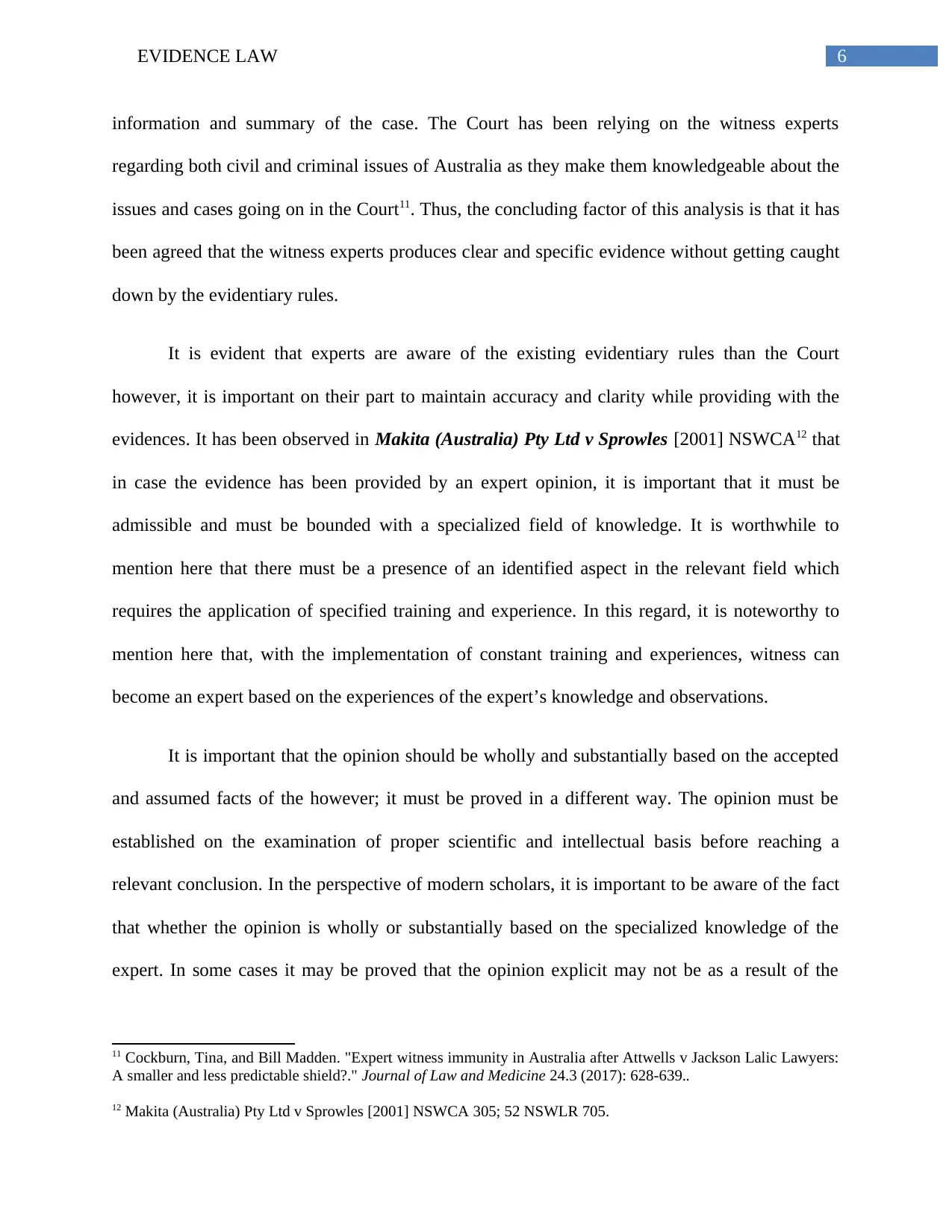
6EVIDENCE LAW
information and summary of the case. The Court has been relying on the witness experts
regarding both civil and criminal issues of Australia as they make them knowledgeable about the
issues and cases going on in the Court11. Thus, the concluding factor of this analysis is that it has
been agreed that the witness experts produces clear and specific evidence without getting caught
down by the evidentiary rules.
It is evident that experts are aware of the existing evidentiary rules than the Court
however, it is important on their part to maintain accuracy and clarity while providing with the
evidences. It has been observed in Makita (Australia) Pty Ltd v Sprowles [2001] NSWCA12 that
in case the evidence has been provided by an expert opinion, it is important that it must be
admissible and must be bounded with a specialized field of knowledge. It is worthwhile to
mention here that there must be a presence of an identified aspect in the relevant field which
requires the application of specified training and experience. In this regard, it is noteworthy to
mention here that, with the implementation of constant training and experiences, witness can
become an expert based on the experiences of the expert’s knowledge and observations.
It is important that the opinion should be wholly and substantially based on the accepted
and assumed facts of the however; it must be proved in a different way. The opinion must be
established on the examination of proper scientific and intellectual basis before reaching a
relevant conclusion. In the perspective of modern scholars, it is important to be aware of the fact
that whether the opinion is wholly or substantially based on the specialized knowledge of the
expert. In some cases it may be proved that the opinion explicit may not be as a result of the
11 Cockburn, Tina, and Bill Madden. "Expert witness immunity in Australia after Attwells v Jackson Lalic Lawyers:
A smaller and less predictable shield?." Journal of Law and Medicine 24.3 (2017): 628-639..
12 Makita (Australia) Pty Ltd v Sprowles [2001] NSWCA 305; 52 NSWLR 705.
information and summary of the case. The Court has been relying on the witness experts
regarding both civil and criminal issues of Australia as they make them knowledgeable about the
issues and cases going on in the Court11. Thus, the concluding factor of this analysis is that it has
been agreed that the witness experts produces clear and specific evidence without getting caught
down by the evidentiary rules.
It is evident that experts are aware of the existing evidentiary rules than the Court
however, it is important on their part to maintain accuracy and clarity while providing with the
evidences. It has been observed in Makita (Australia) Pty Ltd v Sprowles [2001] NSWCA12 that
in case the evidence has been provided by an expert opinion, it is important that it must be
admissible and must be bounded with a specialized field of knowledge. It is worthwhile to
mention here that there must be a presence of an identified aspect in the relevant field which
requires the application of specified training and experience. In this regard, it is noteworthy to
mention here that, with the implementation of constant training and experiences, witness can
become an expert based on the experiences of the expert’s knowledge and observations.
It is important that the opinion should be wholly and substantially based on the accepted
and assumed facts of the however; it must be proved in a different way. The opinion must be
established on the examination of proper scientific and intellectual basis before reaching a
relevant conclusion. In the perspective of modern scholars, it is important to be aware of the fact
that whether the opinion is wholly or substantially based on the specialized knowledge of the
expert. In some cases it may be proved that the opinion explicit may not be as a result of the
11 Cockburn, Tina, and Bill Madden. "Expert witness immunity in Australia after Attwells v Jackson Lalic Lawyers:
A smaller and less predictable shield?." Journal of Law and Medicine 24.3 (2017): 628-639..
12 Makita (Australia) Pty Ltd v Sprowles [2001] NSWCA 305; 52 NSWLR 705.
Paraphrase This Document
Need a fresh take? Get an instant paraphrase of this document with our AI Paraphraser
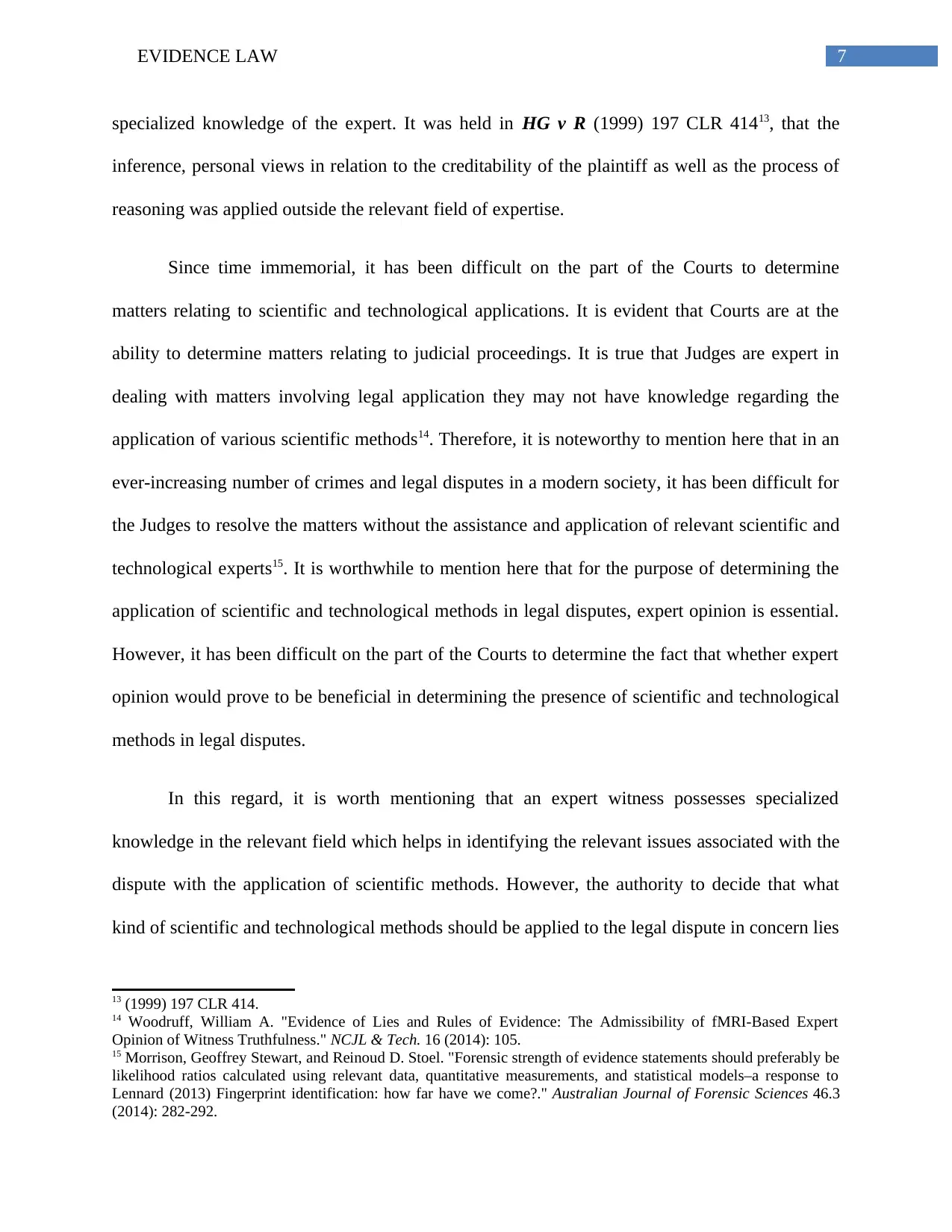
7EVIDENCE LAW
specialized knowledge of the expert. It was held in HG v R (1999) 197 CLR 41413, that the
inference, personal views in relation to the creditability of the plaintiff as well as the process of
reasoning was applied outside the relevant field of expertise.
Since time immemorial, it has been difficult on the part of the Courts to determine
matters relating to scientific and technological applications. It is evident that Courts are at the
ability to determine matters relating to judicial proceedings. It is true that Judges are expert in
dealing with matters involving legal application they may not have knowledge regarding the
application of various scientific methods14. Therefore, it is noteworthy to mention here that in an
ever-increasing number of crimes and legal disputes in a modern society, it has been difficult for
the Judges to resolve the matters without the assistance and application of relevant scientific and
technological experts15. It is worthwhile to mention here that for the purpose of determining the
application of scientific and technological methods in legal disputes, expert opinion is essential.
However, it has been difficult on the part of the Courts to determine the fact that whether expert
opinion would prove to be beneficial in determining the presence of scientific and technological
methods in legal disputes.
In this regard, it is worth mentioning that an expert witness possesses specialized
knowledge in the relevant field which helps in identifying the relevant issues associated with the
dispute with the application of scientific methods. However, the authority to decide that what
kind of scientific and technological methods should be applied to the legal dispute in concern lies
13 (1999) 197 CLR 414.
14 Woodruff, William A. "Evidence of Lies and Rules of Evidence: The Admissibility of fMRI-Based Expert
Opinion of Witness Truthfulness." NCJL & Tech. 16 (2014): 105.
15 Morrison, Geoffrey Stewart, and Reinoud D. Stoel. "Forensic strength of evidence statements should preferably be
likelihood ratios calculated using relevant data, quantitative measurements, and statistical models–a response to
Lennard (2013) Fingerprint identification: how far have we come?." Australian Journal of Forensic Sciences 46.3
(2014): 282-292.
specialized knowledge of the expert. It was held in HG v R (1999) 197 CLR 41413, that the
inference, personal views in relation to the creditability of the plaintiff as well as the process of
reasoning was applied outside the relevant field of expertise.
Since time immemorial, it has been difficult on the part of the Courts to determine
matters relating to scientific and technological applications. It is evident that Courts are at the
ability to determine matters relating to judicial proceedings. It is true that Judges are expert in
dealing with matters involving legal application they may not have knowledge regarding the
application of various scientific methods14. Therefore, it is noteworthy to mention here that in an
ever-increasing number of crimes and legal disputes in a modern society, it has been difficult for
the Judges to resolve the matters without the assistance and application of relevant scientific and
technological experts15. It is worthwhile to mention here that for the purpose of determining the
application of scientific and technological methods in legal disputes, expert opinion is essential.
However, it has been difficult on the part of the Courts to determine the fact that whether expert
opinion would prove to be beneficial in determining the presence of scientific and technological
methods in legal disputes.
In this regard, it is worth mentioning that an expert witness possesses specialized
knowledge in the relevant field which helps in identifying the relevant issues associated with the
dispute with the application of scientific methods. However, the authority to decide that what
kind of scientific and technological methods should be applied to the legal dispute in concern lies
13 (1999) 197 CLR 414.
14 Woodruff, William A. "Evidence of Lies and Rules of Evidence: The Admissibility of fMRI-Based Expert
Opinion of Witness Truthfulness." NCJL & Tech. 16 (2014): 105.
15 Morrison, Geoffrey Stewart, and Reinoud D. Stoel. "Forensic strength of evidence statements should preferably be
likelihood ratios calculated using relevant data, quantitative measurements, and statistical models–a response to
Lennard (2013) Fingerprint identification: how far have we come?." Australian Journal of Forensic Sciences 46.3
(2014): 282-292.
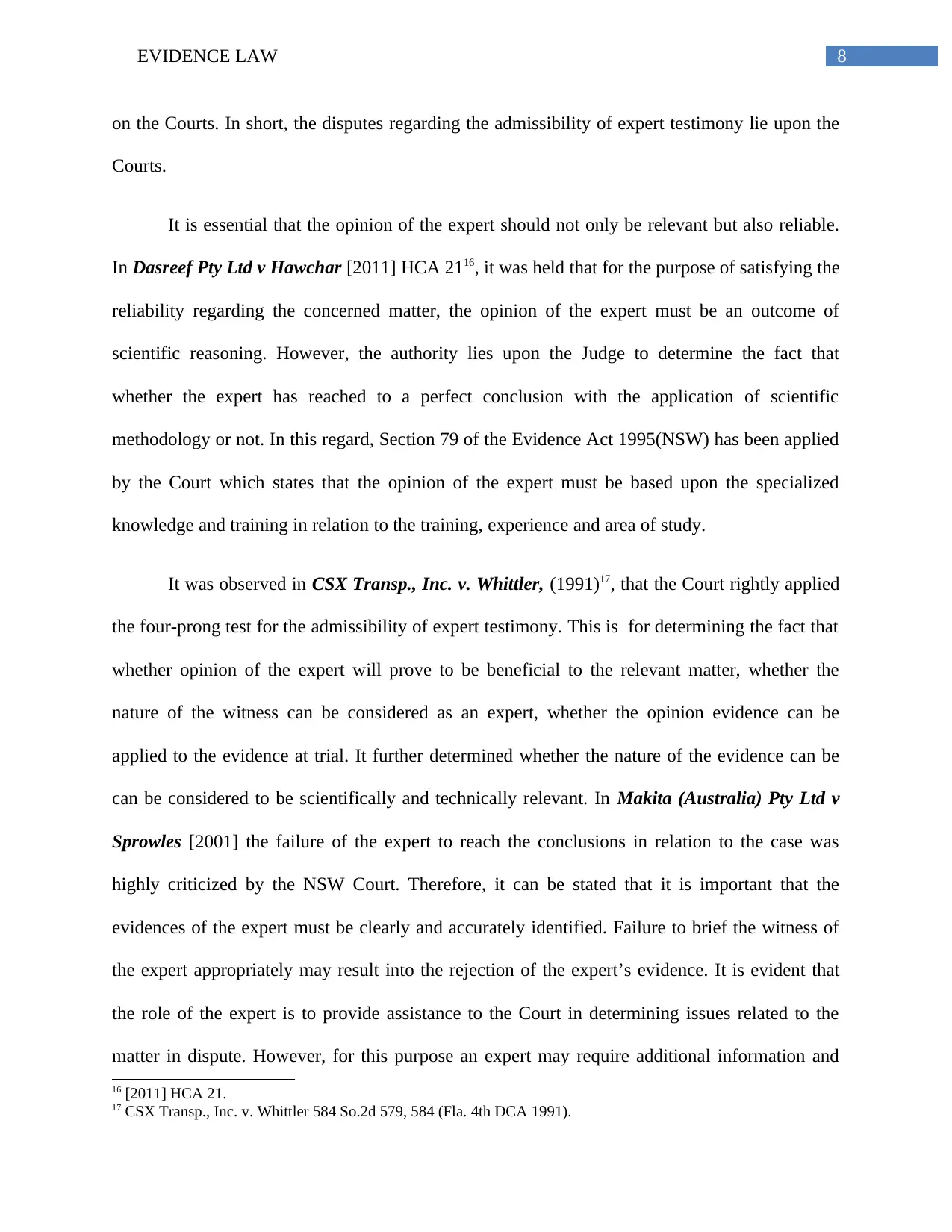
8EVIDENCE LAW
on the Courts. In short, the disputes regarding the admissibility of expert testimony lie upon the
Courts.
It is essential that the opinion of the expert should not only be relevant but also reliable.
In Dasreef Pty Ltd v Hawchar [2011] HCA 2116, it was held that for the purpose of satisfying the
reliability regarding the concerned matter, the opinion of the expert must be an outcome of
scientific reasoning. However, the authority lies upon the Judge to determine the fact that
whether the expert has reached to a perfect conclusion with the application of scientific
methodology or not. In this regard, Section 79 of the Evidence Act 1995(NSW) has been applied
by the Court which states that the opinion of the expert must be based upon the specialized
knowledge and training in relation to the training, experience and area of study.
It was observed in CSX Transp., Inc. v. Whittler, (1991)17, that the Court rightly applied
the four-prong test for the admissibility of expert testimony. This is for determining the fact that
whether opinion of the expert will prove to be beneficial to the relevant matter, whether the
nature of the witness can be considered as an expert, whether the opinion evidence can be
applied to the evidence at trial. It further determined whether the nature of the evidence can be
can be considered to be scientifically and technically relevant. In Makita (Australia) Pty Ltd v
Sprowles [2001] the failure of the expert to reach the conclusions in relation to the case was
highly criticized by the NSW Court. Therefore, it can be stated that it is important that the
evidences of the expert must be clearly and accurately identified. Failure to brief the witness of
the expert appropriately may result into the rejection of the expert’s evidence. It is evident that
the role of the expert is to provide assistance to the Court in determining issues related to the
matter in dispute. However, for this purpose an expert may require additional information and
16 [2011] HCA 21.
17 CSX Transp., Inc. v. Whittler 584 So.2d 579, 584 (Fla. 4th DCA 1991).
on the Courts. In short, the disputes regarding the admissibility of expert testimony lie upon the
Courts.
It is essential that the opinion of the expert should not only be relevant but also reliable.
In Dasreef Pty Ltd v Hawchar [2011] HCA 2116, it was held that for the purpose of satisfying the
reliability regarding the concerned matter, the opinion of the expert must be an outcome of
scientific reasoning. However, the authority lies upon the Judge to determine the fact that
whether the expert has reached to a perfect conclusion with the application of scientific
methodology or not. In this regard, Section 79 of the Evidence Act 1995(NSW) has been applied
by the Court which states that the opinion of the expert must be based upon the specialized
knowledge and training in relation to the training, experience and area of study.
It was observed in CSX Transp., Inc. v. Whittler, (1991)17, that the Court rightly applied
the four-prong test for the admissibility of expert testimony. This is for determining the fact that
whether opinion of the expert will prove to be beneficial to the relevant matter, whether the
nature of the witness can be considered as an expert, whether the opinion evidence can be
applied to the evidence at trial. It further determined whether the nature of the evidence can be
can be considered to be scientifically and technically relevant. In Makita (Australia) Pty Ltd v
Sprowles [2001] the failure of the expert to reach the conclusions in relation to the case was
highly criticized by the NSW Court. Therefore, it can be stated that it is important that the
evidences of the expert must be clearly and accurately identified. Failure to brief the witness of
the expert appropriately may result into the rejection of the expert’s evidence. It is evident that
the role of the expert is to provide assistance to the Court in determining issues related to the
matter in dispute. However, for this purpose an expert may require additional information and
16 [2011] HCA 21.
17 CSX Transp., Inc. v. Whittler 584 So.2d 579, 584 (Fla. 4th DCA 1991).
⊘ This is a preview!⊘
Do you want full access?
Subscribe today to unlock all pages.

Trusted by 1+ million students worldwide
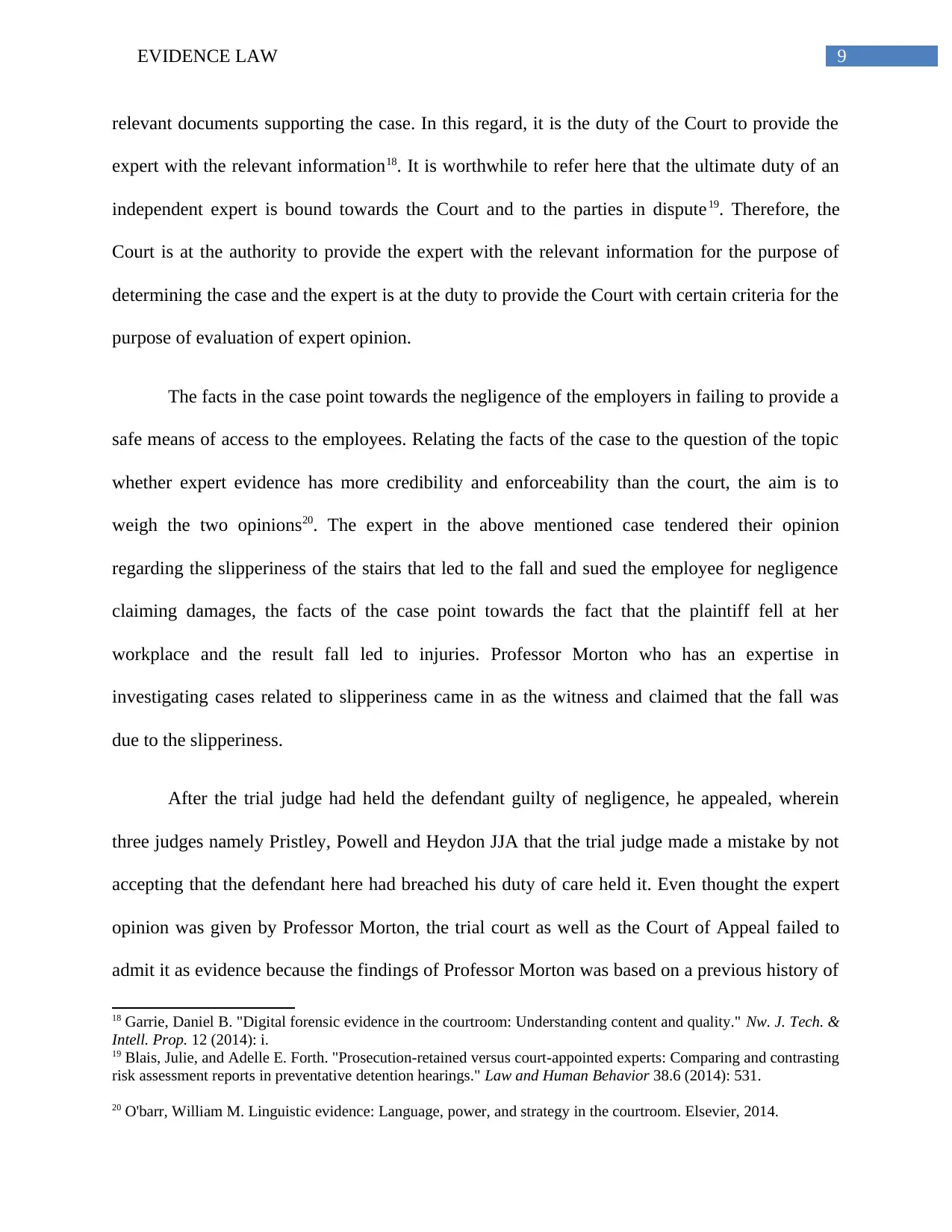
9EVIDENCE LAW
relevant documents supporting the case. In this regard, it is the duty of the Court to provide the
expert with the relevant information18. It is worthwhile to refer here that the ultimate duty of an
independent expert is bound towards the Court and to the parties in dispute19. Therefore, the
Court is at the authority to provide the expert with the relevant information for the purpose of
determining the case and the expert is at the duty to provide the Court with certain criteria for the
purpose of evaluation of expert opinion.
The facts in the case point towards the negligence of the employers in failing to provide a
safe means of access to the employees. Relating the facts of the case to the question of the topic
whether expert evidence has more credibility and enforceability than the court, the aim is to
weigh the two opinions20. The expert in the above mentioned case tendered their opinion
regarding the slipperiness of the stairs that led to the fall and sued the employee for negligence
claiming damages, the facts of the case point towards the fact that the plaintiff fell at her
workplace and the result fall led to injuries. Professor Morton who has an expertise in
investigating cases related to slipperiness came in as the witness and claimed that the fall was
due to the slipperiness.
After the trial judge had held the defendant guilty of negligence, he appealed, wherein
three judges namely Pristley, Powell and Heydon JJA that the trial judge made a mistake by not
accepting that the defendant here had breached his duty of care held it. Even thought the expert
opinion was given by Professor Morton, the trial court as well as the Court of Appeal failed to
admit it as evidence because the findings of Professor Morton was based on a previous history of
18 Garrie, Daniel B. "Digital forensic evidence in the courtroom: Understanding content and quality." Nw. J. Tech. &
Intell. Prop. 12 (2014): i.
19 Blais, Julie, and Adelle E. Forth. "Prosecution-retained versus court-appointed experts: Comparing and contrasting
risk assessment reports in preventative detention hearings." Law and Human Behavior 38.6 (2014): 531.
20 O'barr, William M. Linguistic evidence: Language, power, and strategy in the courtroom. Elsevier, 2014.
relevant documents supporting the case. In this regard, it is the duty of the Court to provide the
expert with the relevant information18. It is worthwhile to refer here that the ultimate duty of an
independent expert is bound towards the Court and to the parties in dispute19. Therefore, the
Court is at the authority to provide the expert with the relevant information for the purpose of
determining the case and the expert is at the duty to provide the Court with certain criteria for the
purpose of evaluation of expert opinion.
The facts in the case point towards the negligence of the employers in failing to provide a
safe means of access to the employees. Relating the facts of the case to the question of the topic
whether expert evidence has more credibility and enforceability than the court, the aim is to
weigh the two opinions20. The expert in the above mentioned case tendered their opinion
regarding the slipperiness of the stairs that led to the fall and sued the employee for negligence
claiming damages, the facts of the case point towards the fact that the plaintiff fell at her
workplace and the result fall led to injuries. Professor Morton who has an expertise in
investigating cases related to slipperiness came in as the witness and claimed that the fall was
due to the slipperiness.
After the trial judge had held the defendant guilty of negligence, he appealed, wherein
three judges namely Pristley, Powell and Heydon JJA that the trial judge made a mistake by not
accepting that the defendant here had breached his duty of care held it. Even thought the expert
opinion was given by Professor Morton, the trial court as well as the Court of Appeal failed to
admit it as evidence because the findings of Professor Morton was based on a previous history of
18 Garrie, Daniel B. "Digital forensic evidence in the courtroom: Understanding content and quality." Nw. J. Tech. &
Intell. Prop. 12 (2014): i.
19 Blais, Julie, and Adelle E. Forth. "Prosecution-retained versus court-appointed experts: Comparing and contrasting
risk assessment reports in preventative detention hearings." Law and Human Behavior 38.6 (2014): 531.
20 O'barr, William M. Linguistic evidence: Language, power, and strategy in the courtroom. Elsevier, 2014.
Paraphrase This Document
Need a fresh take? Get an instant paraphrase of this document with our AI Paraphraser
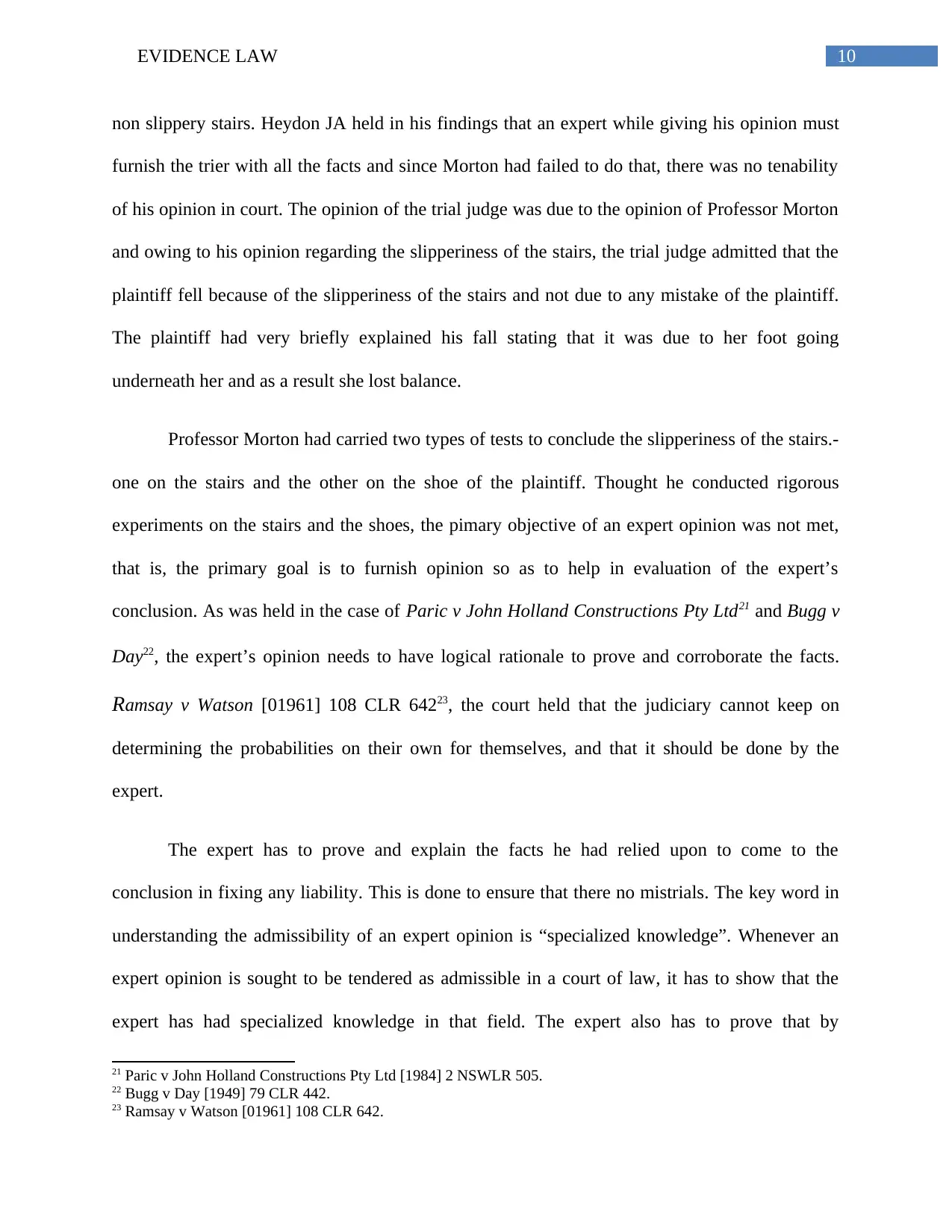
10EVIDENCE LAW
non slippery stairs. Heydon JA held in his findings that an expert while giving his opinion must
furnish the trier with all the facts and since Morton had failed to do that, there was no tenability
of his opinion in court. The opinion of the trial judge was due to the opinion of Professor Morton
and owing to his opinion regarding the slipperiness of the stairs, the trial judge admitted that the
plaintiff fell because of the slipperiness of the stairs and not due to any mistake of the plaintiff.
The plaintiff had very briefly explained his fall stating that it was due to her foot going
underneath her and as a result she lost balance.
Professor Morton had carried two types of tests to conclude the slipperiness of the stairs.-
one on the stairs and the other on the shoe of the plaintiff. Thought he conducted rigorous
experiments on the stairs and the shoes, the pimary objective of an expert opinion was not met,
that is, the primary goal is to furnish opinion so as to help in evaluation of the expert’s
conclusion. As was held in the case of Paric v John Holland Constructions Pty Ltd21 and Bugg v
Day22, the expert’s opinion needs to have logical rationale to prove and corroborate the facts.
Ramsay v Watson [01961] 108 CLR 64223, the court held that the judiciary cannot keep on
determining the probabilities on their own for themselves, and that it should be done by the
expert.
The expert has to prove and explain the facts he had relied upon to come to the
conclusion in fixing any liability. This is done to ensure that there no mistrials. The key word in
understanding the admissibility of an expert opinion is “specialized knowledge”. Whenever an
expert opinion is sought to be tendered as admissible in a court of law, it has to show that the
expert has had specialized knowledge in that field. The expert also has to prove that by
21 Paric v John Holland Constructions Pty Ltd [1984] 2 NSWLR 505.
22 Bugg v Day [1949] 79 CLR 442.
23 Ramsay v Watson [01961] 108 CLR 642.
non slippery stairs. Heydon JA held in his findings that an expert while giving his opinion must
furnish the trier with all the facts and since Morton had failed to do that, there was no tenability
of his opinion in court. The opinion of the trial judge was due to the opinion of Professor Morton
and owing to his opinion regarding the slipperiness of the stairs, the trial judge admitted that the
plaintiff fell because of the slipperiness of the stairs and not due to any mistake of the plaintiff.
The plaintiff had very briefly explained his fall stating that it was due to her foot going
underneath her and as a result she lost balance.
Professor Morton had carried two types of tests to conclude the slipperiness of the stairs.-
one on the stairs and the other on the shoe of the plaintiff. Thought he conducted rigorous
experiments on the stairs and the shoes, the pimary objective of an expert opinion was not met,
that is, the primary goal is to furnish opinion so as to help in evaluation of the expert’s
conclusion. As was held in the case of Paric v John Holland Constructions Pty Ltd21 and Bugg v
Day22, the expert’s opinion needs to have logical rationale to prove and corroborate the facts.
Ramsay v Watson [01961] 108 CLR 64223, the court held that the judiciary cannot keep on
determining the probabilities on their own for themselves, and that it should be done by the
expert.
The expert has to prove and explain the facts he had relied upon to come to the
conclusion in fixing any liability. This is done to ensure that there no mistrials. The key word in
understanding the admissibility of an expert opinion is “specialized knowledge”. Whenever an
expert opinion is sought to be tendered as admissible in a court of law, it has to show that the
expert has had specialized knowledge in that field. The expert also has to prove that by
21 Paric v John Holland Constructions Pty Ltd [1984] 2 NSWLR 505.
22 Bugg v Day [1949] 79 CLR 442.
23 Ramsay v Watson [01961] 108 CLR 642.
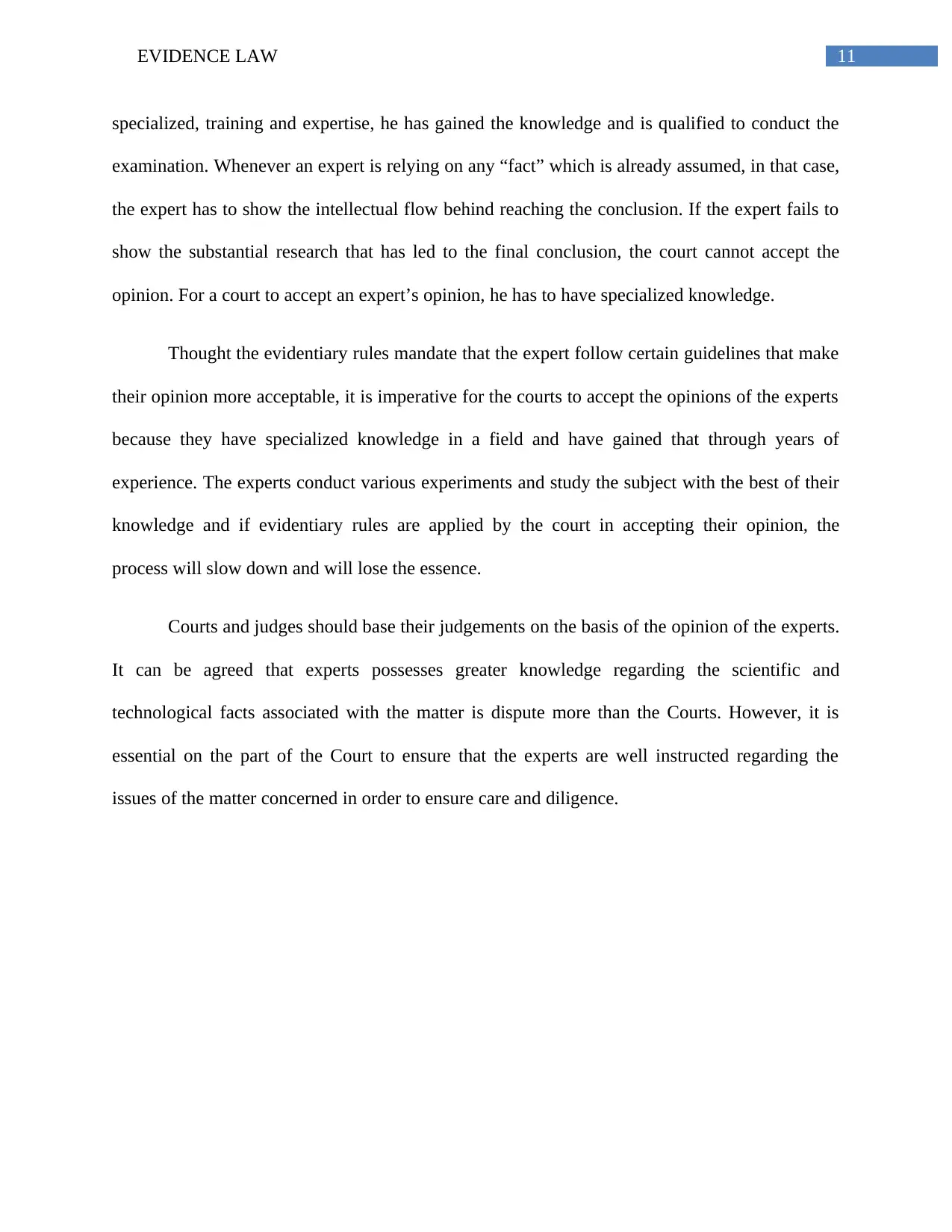
11EVIDENCE LAW
specialized, training and expertise, he has gained the knowledge and is qualified to conduct the
examination. Whenever an expert is relying on any “fact” which is already assumed, in that case,
the expert has to show the intellectual flow behind reaching the conclusion. If the expert fails to
show the substantial research that has led to the final conclusion, the court cannot accept the
opinion. For a court to accept an expert’s opinion, he has to have specialized knowledge.
Thought the evidentiary rules mandate that the expert follow certain guidelines that make
their opinion more acceptable, it is imperative for the courts to accept the opinions of the experts
because they have specialized knowledge in a field and have gained that through years of
experience. The experts conduct various experiments and study the subject with the best of their
knowledge and if evidentiary rules are applied by the court in accepting their opinion, the
process will slow down and will lose the essence.
Courts and judges should base their judgements on the basis of the opinion of the experts.
It can be agreed that experts possesses greater knowledge regarding the scientific and
technological facts associated with the matter is dispute more than the Courts. However, it is
essential on the part of the Court to ensure that the experts are well instructed regarding the
issues of the matter concerned in order to ensure care and diligence.
specialized, training and expertise, he has gained the knowledge and is qualified to conduct the
examination. Whenever an expert is relying on any “fact” which is already assumed, in that case,
the expert has to show the intellectual flow behind reaching the conclusion. If the expert fails to
show the substantial research that has led to the final conclusion, the court cannot accept the
opinion. For a court to accept an expert’s opinion, he has to have specialized knowledge.
Thought the evidentiary rules mandate that the expert follow certain guidelines that make
their opinion more acceptable, it is imperative for the courts to accept the opinions of the experts
because they have specialized knowledge in a field and have gained that through years of
experience. The experts conduct various experiments and study the subject with the best of their
knowledge and if evidentiary rules are applied by the court in accepting their opinion, the
process will slow down and will lose the essence.
Courts and judges should base their judgements on the basis of the opinion of the experts.
It can be agreed that experts possesses greater knowledge regarding the scientific and
technological facts associated with the matter is dispute more than the Courts. However, it is
essential on the part of the Court to ensure that the experts are well instructed regarding the
issues of the matter concerned in order to ensure care and diligence.
⊘ This is a preview!⊘
Do you want full access?
Subscribe today to unlock all pages.

Trusted by 1+ million students worldwide
1 out of 14
Related Documents
Your All-in-One AI-Powered Toolkit for Academic Success.
+13062052269
info@desklib.com
Available 24*7 on WhatsApp / Email
![[object Object]](/_next/static/media/star-bottom.7253800d.svg)
Unlock your academic potential
Copyright © 2020–2026 A2Z Services. All Rights Reserved. Developed and managed by ZUCOL.





